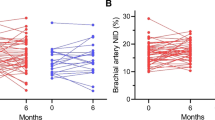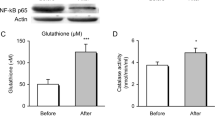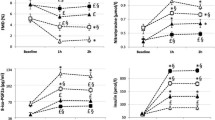Abstract
The aim of this study was to assess whether adherence to a restricted-calorie, Mediterranean-type diet improves endothelial dysfunction and markers of oxidative stress in patients with metabolic syndrome. A moderately low-calorie (600 calories/day negative energy balance), low-fat, high-carbohydrate diet (<30% energy from fat, <10% from saturated fat and 55% from carbohydrate) was prescribed to 53 outpatients with the metabolic syndrome. Participants were divided into two groups according to body weight loss > or < 5% after 6 months. Group A (n = 23) showed a remarkable decrease in body weight (−6.8%), body-mass-index (−4.6%), waist circumference (−4.8%), HOMA-IR (−27.2%), plasma glucose, glycosylated haemoglobin, total and LDL-cholesterol, blood pressure, serum NOX2 (the catalytic core of NADPH oxidase) (−22.2%) and urinary8-isoprostanes (−39.0%) and an increase of serum NOx (Nitrite/Nitrate) (+116.8%) and adiponectine (+125.5%) as compared with those in group B (n = 30). A statistically significant increase in brachial artery flow-mediated dilatation was observed in group A (+24.7%; p < 0.001), while no changes were present in group B. Variations of flow-mediated dilatation were statistically and negatively correlated with changes of serum NOX2 levels (p = 0.04), body-mass-index (p < 0.01), waist circumference (0.01), glycosylated haemoglobin (p < 0.01), LDL-cholesterol (p < 0.01) and triglycerides (p < 0.05) and positively correlated with changes of serum NOx (p < 0.001) and adiponectin (p = 0.01). The results show that moderate weight loss is able to improve endothelial dysfunction in patients with the metabolic syndrome. The coexistent decrease of NOX2 activation suggests a role for oxidative stress in eliciting artery dysfunction.

Similar content being viewed by others
References
(2001) Executive summary of the third report of the national cholesterol education program (NCEP) Expert panel on detection, evaluation, and treatment of high blood cholesterol in adults (adult treatment panel III) JAMA 285:2486–2497
Despres JP, Lemieux I, Bergeron J et al (2008) Abdominal obesity and the metabolic syndrome: contribution to global cardiometabolic risk. Arterioscler Thromb Vasc Biol 28:1039–1049
Grundy SM (2008) Metabolic syndrome pandemic. Arterioscler Thromb Vasc Biol 28:629–636
Landmesser U, Drexler H (2005) The clinical significance of endothelial dysfunction. Curr Opin Cardiol 20: 547–-551
Corretti MC, Anderson TJ, Benjamin EJ et al (2002) Guidelines for the ultrasound assessment of endothelial-dependent flow-mediated vasodilation of the brachial artery: a report of the international brachial artery reactivity task force. J Am Coll Cardiol 39:257–265
Singh U, Jialal I (2006) Oxidative stress and atherosclerosis. Pathophysiology 13:129–142
Cangemi R, Angelico F, Loffredo L et al (2007) Oxidative stress-mediated arterial dysfunction in patients with metabolic syndrome: effect of ascorbic acid. Free Radic Biol Med 43:853–859
Hamburg NM, Larson MG, Vita JA et al (2008) Metabolic syndrome, insulin resistance, and brachial artery vasodilator function in Framingham Offspring participants without clinical evidence of cardiovascular disease. Am J Cardiol 101:82–88
Joannides R, Haefeli WE, Linder L et al (1995) Nitric oxide is responsible for flow-dependent dilatation of human peripheral conduit arteries in vivo. Circulation 91:1314–1319
Cooke JP (2003) Flow, NO, and atherogenesis. Proc Natl Acad Sci USA 100:768–770
Heiss C, Lauer T, Dejam A et al (2006) Plasma nitroso compounds are decreased in patients with endothelial dysfunction. J Am Coll Cardiol 47:573–579
Loffredo L, Marcoccia A, Pignatelli P et al (2007) Oxidative-stress-mediated arterial dysfunction in patients with peripheral arterial disease. Eur Heart J 28:608–612
Cai H, Harrison DG (2000) Endothelial dysfunction in cardiovascular diseases: the role of oxidant stress. Circ Res 87:840–844
Violi F, Marino R, Milite MT, Loffredo L (1999) Nitric oxide and its role in lipid peroxidation. Diabetes Metab Res Rev 15:283–288
Dai J, Jones DP, Goldberg J et al (2008) Association between adherence to the Mediterranean diet and oxidative stress. Am J Clin Nutr 88:1364–1370
Rallidis LS, Lekakis J, Kolomvotsou A et al (2009) Close adherence to a Mediterranean diet improves endothelial function in subjects with abdominal obesity. Am J Clin Nutr 90:263–268
Forstermann U (2008) Oxidative stress in vascular disease: causes, defense mechanisms and potential therapies. Nat Clin Pract Cardiovasc Med 5:338–349
Bendall JK, Rinze R, Adlam D et al (2007) Endothelial Nox2 overexpression potentiates vascular oxidative stress and hemodynamic response to angiotensin II: studies in endothelial-targeted Nox2 transgenic mice. Circ Res 100:1016–1025
Oelze M, Warnholtz A, Faulhaber J et al (2006) NADPH oxidase accounts for enhanced superoxide production and impaired endothelium-dependent smooth muscle relaxation in BKbeta1-/- mice. Arterioscler Thromb Vasc Biol 26:1753–1759
Jung O, Schreiber JG, Geiger H, Pedrazzini T, Busse R, Brandes RP (2004) gp91phox-containing NADPH oxidase mediates endothelial dysfunction in renovascular hypertension. Circulation 109:1795–1801
Violi F, Sanguigni V, Carnevale R et al (2009) Hereditary deficiency of gp91(phox) is associated with enhanced arterial dilatation: results of a multicenter study. Circulation 120:1616–1622
Alberti KG, Zimmet P, Shaw J (2006) Metabolic syndrome-a new world-wide definition. A Consensus Statement from the International Diabetes Federation. Diabet Med 23:469–480
Wang Z, Ciabattoni G, Creminon C et al (1995) Immunological characterization of urinary 8-epi-prostaglandin F2 alpha excretion in man. J Pharmacol Exp Ther 275:94–100
Pignatelli P, Carnevale R, Cangemi R et al (2010) Atorvastatin inhibits gp91phox circulating levels in patients with hypercholesterolemia. Arterioscler Thromb Vasc Biol 30:360–367
Fortuno A, Bidegain J, Robador PA et al (2009) Losartan metabolite EXP3179 blocks NADPH oxidase-mediated superoxide production by inhibiting protein kinase C: potential clinical implications in hypertension. Hypertension 54:744–750
Fito M, Guxens M, Corella D et al (2007) Effect of a traditional Mediterranean diet on lipoprotein oxidation: a randomized controlled trial. Arch Intern Med 167:1195–1203
Shai I, Schwarzfuchs D, Henkin Y et al (2008) Weight loss with a low-carbohydrate, Mediterranean, or low-fat diet. N Engl J Med 359:229–241
Sacks FM, Bray GA, Carey VJ et al (2009) Comparison of weight-loss diets with different compositions of fat, protein, and carbohydrates. N Engl J Med 360:859–873
Keogh JB, Brinkworth GD, Noakes M, Belobrajdic DP, Buckley JD, Clifton PM (2008) Effects of weight loss from a very-low-carbohydrate diet on endothelial function and markers of cardiovascular disease risk in subjects with abdominal obesity. Am J Clin Nutr 87:567–576
Keogh JB, Brinkworth GD, Clifton PM (2007) Effects of weight loss on a low-carbohydrate diet on flow-mediated dilatation, adhesion molecules and adiponectin. Br J Nutr 98:852–859
Williams IL, Chowienczyk PJ, Wheatcroft SB et al (2005) Endothelial function and weight loss in obese humans. Obes Surg 15:1055–1060
Bigornia SJ, Mott MM, Hess DT et al (2010) Long-term successful weight loss improves vascular endothelial function in severely obese individuals. Obesity (Silver Spring) 18:754–759
Davi G, Guagnano MT, Ciabattoni G et al (2002) Platelet activation in obese women: role of inflammation and oxidant stress. JAMA 288:2008–2014
Szabo C, Day BJ, Salzman AL (1996) Evaluation of the relative contribution of nitric oxide and peroxynitrite to the suppression of mitochondrial respiration in immunostimulated macrophages using a manganese mesoporphyrin superoxide dismutase mimetic and peroxynitrite scavenger. FEBS Lett 381:82–86
Carnevale R, Pignatelli P, Di Santo S et al (2010) Atorvastatin inhibits oxidative stress via adiponectin-mediated NADPH oxidase down-regulation in hypercholesterolemic patients. Atherosclerosis 213:225–234
Furukawa S, Fujita T, Shimabukuro M et al (2004) Increased oxidative stress in obesity and its impact on metabolic syndrome. J Clin Invest 114:1752–1761
Nakanishi S, Yamane K, Kamei N, Nojima H, Okubo M, Kohno N (2005) A protective effect of adiponectin against oxidative stress in Japanese Americans: the association between adiponectin or leptin and urinary isoprostane. Metabolism 54:194–199
Tao L, Gao E, Jiao X et al (2007) Adiponectin cardioprotection after myocardial ischemia/reperfusion involves the reduction of oxidative/nitrative stress. Circulation 115:1408–1416
Shai I, Spence JD, Schwarzfuchs D et al (2010) Dietary intervention to reverse carotid atherosclerosis. Circulation 121:1200–1208
Acknowledgments
We wish to thank nurses Monica Brancorsini and Daniela Salzano for their skilful cooperation.
Author Contributions: FA: wrote manuscript/study design; LL: performed statistical analysis and FMD measurements; PP: did study design and coordination; TA: did paper preparation/data elaboration; RC: did laboratory experimental procedures; AP, FA and IM: contributed to clinical data collection and elaboration; SD: performed laboratory experimental procedures; MD: reviewed and edited data; FV: did study design and paper preparation
Summary disclosure: The Authors have nothing to disclose
Conflict of interest
None.
Author information
Authors and Affiliations
Corresponding author
Rights and permissions
About this article
Cite this article
Angelico, F., Loffredo, L., Pignatelli, P. et al. Weight loss is associated with improved endothelial dysfunction via NOX2-generated oxidative stress down-regulation in patients with the metabolic syndrome. Intern Emerg Med 7, 219–227 (2012). https://doi.org/10.1007/s11739-011-0591-x
Received:
Accepted:
Published:
Issue Date:
DOI: https://doi.org/10.1007/s11739-011-0591-x




